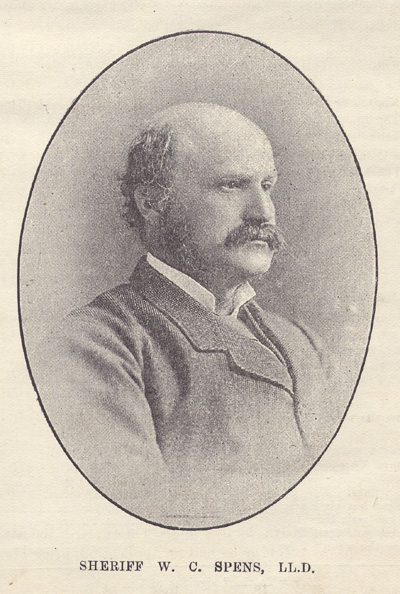 |
|
|
Walter Cook Spens
[Sheriff Spens]
01 February 1842, Glasgow - 13 July 1900, Edinburgh

The Bailie, No. 411, Wednesday, September 1st, 1880
Walter Cook Spens was born in Glasgow on February 1, 1842. He was connected to an old Spens family from Lathallan in Fife.
His parents were William Spens, an actuary and Manager of the Scottish Amicable Life Assurance Society, and Janet Hill Cook.
His early schooling was at Glasgow Academy, followed by the Universities of Glasgow and Edinburgh. He was called to the Bar in 1865.
On 2 August 1870, in Edinburgh, he married Helen Gillespie, daughter of Sir John Gillespie and Margaret Ruth Robertson.
In the same year Sheriff Henry Glassford Bell, a strong player and an important figure in Glasgow chess circles, appointed Spens as a Sheriff-Substitute for Lanarkshire. Spens, who was known there as the "boy-sheriff", as he was only 28 years of age, was on the bench at Hamilton Sheriff Court for six years before transferring to the Glasgow in December 1876, where he remained for the rest of his life.
In 1889 the University of Glasgow conferred on him the honorary title of LL.D.
Spens had been actice in chess matters for many years, including participation in the Dundee 1867 international tournament. His name first appears in the Minute Book of the Glasgow CC in 1872, and at the club's Annual General Meeting in October that year he was appointed Vice-President.
He took part in several West of Scotland v East of Scotland matches, for example in 1880, 1881, 1889, 1890, 1892, 1894, 1896 and 1899.
He was also a composer of chess problems, some of which were published in his chess column in the Glasgow Weekly Herald, which he began editing in 1882.
Sheriff Spens was one of the main driving forces responsible for the founding of the Scottish Chess Association in 1884, the inaugural meeting being held in his chambers at the County Court Buildings in Glasgow on Saturday, February 4, when Sheriff Spens was elected as one of several Vice-Presidents.
The Chess Monthly, Vol. XIII, February 1892, p.161.
Spens participated in every Scottish Chess Association Congress from the inaugural year of 1884 until his death in 1900. He was equal first with W.N. Walker in the 1890 championship but lost the play-off match. He won in 1894.
Other successes were the West of Scotland Championship 1897 and Glasgow Chess Club Champion in 1875, 1879, 1881, 1884, 1887, 1888, 1889.
Sheriff Spens died on Friday 13th July in the University Club, Edinburgh. Hs body was transported to Glasgow for the funeral service held in St. Mary's Episcopal Church, Great Western Road on Monday, 16 July, after which he was buried in Hamilton cemetery.
After his death, a Public subscription raised sufficient funds to purchase the Spens Cup, to be competed for by teams other than those in the primary team competition in Scotland, the Richardson Cup. (Sadly, the original Spens Cup was lost during WWII and had to be replaced.)
At the time of his death Sheriff Spens was a member of the Art Club, the Walter Scott Club and the Glasgow Ballad Club. In 1863, when only twenty-one years of age, he published his first book of poems, Dreams and Realities, and in 1881 there came Darroll and Other Poems. Several of his writings used chess themes and appeared in various chess periodicals, sometimes with the writer identified as W.C.S.
Spens wrote a number of important legal works, some of which showed his interest in social conditions, the poor, and the interests of workers.
In 1875 he published Jurisdiction and Punishments of Summary Criminal Courts, and there followed in 1876 The Sanitary System of Scotland: Its Defects and Proposed Remedies.
Other important works were The History of the Orr Ewing Case, which dealt with differences in the legal systems of Scotland and England and, co-authored with Robert T. Younger, M.A., LL.B., Advocate, Employers and Employed: Being (1) an Exposition of the Law of Reparation for Physical Injury; (2) the Employers' Liability Act, 1880, Annotated with special reference to decisions in England and Scotland; and (3) Suggested Amendment of the Law as to the Liability of Employers. With Appendices and Indices.
Additional information
In the 1851 Census the family is shown at 6 Clarendon Place, Glasgow.In the 1861 Census he is recorded as Age 19, at 3 Granby Terrace, Glasgow (now 6 Hillhead Street, West End area of Glasgow), apprentice clerk, born Glasgow.
In the 1881 Census he is shown as Age 39, Denton Cottage, Govan, Lanark, Scotland, advocate, Sheriff substitute of Larnarkshire. This is in the Partick area of Glasgow (Govan Parish covered a large area).
In 1886 he resided at 3 Westbourne Gardens, Glasgow.
In the 1895 Valuation Roll he is shown as Tenant/Occupier at 1 Prince's Gardens, in the Govan Parish of Partick Burgh. [Now the Dowanhill Area of Glasgow.]
Spens and his wife Helen had eleven children, several of whom died in infancy (one of his poetic works is entitled Beside a Little Grave).
He named one son Henry Glassford Bell Spens, in honour of the Sheriff with whom he played chess, and who had been influential in guiding his professional career. Henry died on active service in 1917, aged twenty-five.
John Gillespie Spens followed his father into law and became an Advocate.
His daughter Janet co-founded Laurel Bank School for Girls in 1903.
A brother, John Alexander Spens (1847-1928), was a co-founder of the legal practice of Maclay, Murray and Spens.
Sources
The Bailie, No. 411, Wednesday, September 1st, 1880.
The Chess Bouquet, 1897.
Falkirk Herald, July 18, 1900, p. 8 (chess column).
British Chess Magazine 1900, pp. 370-373.
The Scotsman, July 14 1900, p. 8.
Glasgow Herald, August 10, 1928, p. 13.
Unpublished History of Glasgow Chess Club.
Scotland's Chess Centenary Book, by C.W. Pritchett and M.D. Thornton, 1984.
The Story of Dundee Chess Club, by Peter W. Walsh, 1984.
http://www.universitystory.gla.ac.uk/biography/?id=WH1300&type=P (Janet Spens)
Alan McGowan
Historian, Chess Scotland
